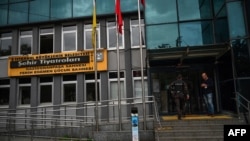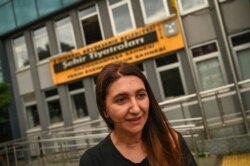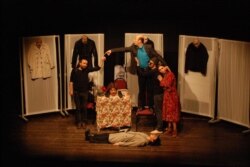The director of a Kurdish-language performance of a 1981 Italian play banned by the Turkish authorities four hours before its stage time is rejecting the government claim that it is a terror propaganda for the Kurdistan Workers Party (PKK).
Beru is a Kurdish adaptation of the Nobel prize-winning Italian playwright Dario Fo’s Trumpets and Raspberries. The play was performed by the independent company Teatra Jiyana Nu, or New Life Theatre, for at least three years in Turkey and abroad until earlier this week when Turkish authorities said it was promoting the PKK group.
“We are not making propaganda but art,” Nazmi Karaman, the director of the play, told VOA.
The ban, he said, was a political move by the government to limit the usage of Kurdish language in public arenas.
Beru was included in the Istanbul Municipal Theatre’s October program as part of a project by the main opposition-held Istanbul Municipality to support independent theater companies struggling during the COVID-19 pandemic. It would have been the first Kurdish-language play staged in the theater’s 106-year history.
Karaman said police delivered to him a banning notice from Istanbul’s Gaziosmanpasa district governor shortly before the play’s final rehearsal on Tuesday. In the notice seen by VOA, the play was accused of violating public order.
“It was not a public order violation or propaganda since today. Why now?” he said, adding that his team had submitted permit applications to the police “many times” with Turkish subtitles for review.
Trumpets and Raspberries has been translated into several languages, including Turkish. The play is a political satire “based upon the richest man and head of the largest car company in Italy at the time,” according to the University of Michigan’s School of Music, Theatre and Dance.
Ruges Kirici, one of the actors in the Kurdish play, said she was stunned that authorities labeled an original Italian play as indoctrination for Kurdish insurgents.
“How is Dario Fo’s play PKK propaganda? Actually, I see this as a joke. Dozens of theater companies have performed this play in Turkey. Trabzon State Theatre also performed this play in the 2001-2002 season,” Kirici told VOA.
Public outcry
The ban on Beru has sparked a controversy in the country, with the pro-Kurdish Peoples’ Democratic Party (HDP) considering it an attack on Kurdish language that reportedly has 5 million speakers in Istanbul alone.
The official census in Turkey does not list ethnicities, but Istanbul is often referred to as the country's largest Kurdish city.
“This is the fascist mentality that we challenge,” the HDP said on its official Twitter account.
Similarly, Ekrem Imamoglu, the mayor of Istanbul from the main opposition Republican People’s Party (CHP), condemned the decision in a statement Wednesday.
Referring to a government move to broadcast an interview with PKK leader Abdullah Ocalan’s brother Osman Ocalan on state TV channel TRT Kurdi before last year’s local elections, Imamoglu said, “it’s allowed for a terrorist group member who is sought with a red notice to make a statement on TV, but it’s banned to stage a play in Kurdish. This is unacceptable.”
Turkish authorities, however, have denied that the ban was imposed due to its rendition in Kurdish.
Ismail Catakli, the interior ministry spokesperson, on Twitter called the criticism as “another lie, another provocation.”
"A theater play spreading the PKK terror organization’s propaganda will be allowed neither in Kurdish, Turkish nor in Arabic," Catakli added.
In a press statement released on Wednesday, Istanbul governorate announced it has opened an investigation into the claims that it pushed for the PKK narrative.
PKK conflict
The PKK, a designated terrorist organization by Turkey, the United States, and the European Union, has fought Turkey since 1984. The conflict has left more than 40,000 people dead.
The Turkish government over the years has come under criticism from several human rights organizations alleging that it uses the PKK conflict as a broad brush to crack down on the Kurds.
“The conflict with the PKK has been used to justify discriminatory measures against Kurds, including the prohibition of Kurdish festivals for security reasons and the reversal of Kurdish municipal officials’ efforts to promote their language and culture,” noted Freedom House in its Freedom in the World 2020 report.
According to Lisel Hintz, a professor at Johns Hopkins University’s School of Advanced International Studies, the suppression of the Kurdish movement through the restriction of arts represents a broader attempt by the ruling Justice and Development Party (AKP) “to police and patrol the kinds of identities that its citizens are able to have.”
“I think it's also representative of a de-democratization movement that is directed particularly at Kurds, at the Peoples’ Democratic Party and at anyone who supports them,” Hintz told VOA.
Last month, Turkey issued arrest warrants for 82 members of the HDP, including the mayor of Kars, over pro-Kurdish protests held in 2014. The protests were sparked by the seizure of Kobane, a mainly Kurdish town in northern Syria, by the Islamic State.
Hintz charged that the ban on Beru is likely a tactic by the ruling AKP to portray the main opposition CHP as cozying up to the Kurdish movement.
“This represents a way in which the AKP can try to sort of smear the CHP with being associated with Kurds which in and of itself is insulting. The idea that just being associated with the Kurdish movement is something that is dangerous, unpatriotic or inauthentic is, in itself, reprehensible,” she added.
Mem Botanî contributed to this report from Istanbul, Turkey.






